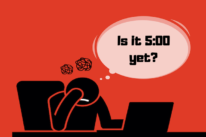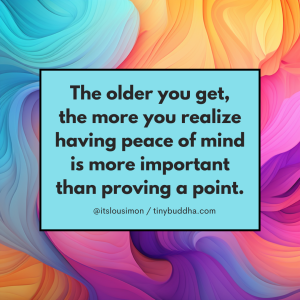
“The quality of your life is in direct proportion to the amount of uncertainty you can comfortably deal with.” ~Tony Robbins
We spend a lot of time in life not knowing.
There are a lot of things that we’re comfortable not knowing. Not knowing a stranger’s name. Not knowing our credit card number or a friend’s address. Not knowing the capital of Vermont.
We’re comfortable with these things because we know there are answers. Even if we have to get on our smartphones for few minutes to find them, we know these things are all facts that actually exist.
But there are lots of other things that we really want to know, like if our decision is going to be the right one, or if a job is going to work out, or if we’re about to be laid off.
What is the best use of my life? What is my mission? These things are unanswerable. There are many things that we simply can’t know.
And while we think it would be nice to know these things, to know the future, I’m here to tell you it’s really not the case. Even if we could know these things, we’re actually better off not knowing them.
Last year, I took a new job in sales. It was a big change for me. I’d been in consulting and legal practice the rest of my career, and while part of my past work had been around growing relationships and coming up with ideas for new projects, I’d never taken a job where I was a “sales guy,” where I would be evaluated solely on my “number.”
When I took the job, I was given a quota that, if I met it, would mean a significant increase in my pay. I was also told that I’d be groomed for greater responsibilities, that I was seen as a likely future member of senior management.
The company has some cutting edge ways of looking at health care expenses and we help millions of people live better, healthier lives. It was a mission that I enthusiastically signed up for.
This is what has happened since:
The company has been through three major restructurings. Several of my peers, including the two people who brought me in for grooming, have either quit or been let go.
The market has dried up for our services, even as we were able to prove their effectiveness with randomized controlled trials. There have been virtually no new sales. This means that I have taken a substantial pay cut and have had to dip into my savings to meet my expenses.
The company has made almost no progress on new offerings, and several current clients have left. There is some encouraging talk of new partnerships and capabilities, but these will take months to implement.
I sold nothing last year and am unlikely to sell much this year. And the most enthusiastic advocates for my development within the organization are gone.
Now the question is had I known all that, would I have taken the job? And the answer is almost certainly no.
But that would have been a big mistake—because I’ve learned so much.
I’ve learned a whole new industry.
I’ve broadened my relationships and deepened my friendships.
I’ve learned to let go of what I can’t control.
I’ve learned that my value can’t be reduced to a percentage of a quota.
I’ve learned to see and address my fears—of not having enough, of having to sell my house, of having my friends think I’m a failure.
I’ve learned to be an advocate for what I need.
I’ve learned to define success differently and to understand better what brings me happiness.
And I’ve had time to explore blogging and teaching about applying wisdom practices to the workplace, and have personally seen the benefits of those practices on a daily basis.
In short, I would not have traded this experience for anything.
Here are 5 reasons why it’s sometimes OK to not know what’s coming next:
1. Not knowing takes the pressure off.
When we think we should know, we get stressed out when we don’t know things. But when we see that not knowing is our natural state, we can actually open into that, into a state of curious detachment, of childlike wonder. What’s going to happen next? Will it be a pleasant surprise, a learning opportunity, or both?
We can see that, in a sense, we can’t know anything. We’ve never known anything. So when the time comes to make a decision, we just give it our best shot. And we know that we can always adjust if we need to.
2. Not knowing saves time.
When you know you don’t know (and can’t know), you look at the world differently. Think of the time and money that we spend on trying to predict the future. I’m a big fan of sports radio. About ninety percent of it is pure speculation on who’s going to win or lose and what that might mean. And the news is no different: the debt crisis, the economy, the next Presidential race.
We don’t know what’s going to happen with any of this stuff. It’s possible just to admit that. Instead of trying to keep up with what all the pundits are saying, we can spend our time doing things we enjoy, like spending time with our spouse and kids. Or enjoying a walk in the park.
3. Not knowing fosters learning.
I wouldn’t have taken my current job if I’d known the outcome. And I would have lost so much in the process. I think we can all point to bad experiences that we would not have chosen—a difficult job, the death of someone close to us, struggling with a health issue.
And yet most of our growth comes from pain. I’ve seen paraplegics and cancer victims smile as they relate the growth that has come from their condition, insisting they wouldn’t have things any other way. Often we only recognize in retrospect how valuable an experience has been.
4. Not knowing brings the joy of surprise.
Of course we don’t want to know when bad stuff is going to happen. But what about the surprise call from a friend? What about the windfall you didn’t know was coming? What about the laughter of a child?
A lot of the joy in life comes from surprise, too. And knowing exactly what’s coming would take all of that away.
5. We have no choice.
Let’s face it, not knowing is the natural state of things. When we want to know things that we can’t know (like the future, or the right course of action), all we create is frustration for ourselves.
I know this can sound like “suck it up, you can’t change anything,” but we really can change a lot. When we understand that we can’t control what happens, we can devote more of our energy to how we respond and what we learn. And we can open to a new sense of ease in the process.
Photo by chema.foces
About Jeff Munn
Jeff Munn is a coach, writer, and speaker on using meditation as a platform for personal transformation and professional success. You can read his blog at http://jeffmunncoaching.com.













 Though I run this site, it is not mine. It's ours. It's not about me. It's about us. Your stories and your wisdom are just as meaningful as mine.
Though I run this site, it is not mine. It's ours. It's not about me. It's about us. Your stories and your wisdom are just as meaningful as mine. 